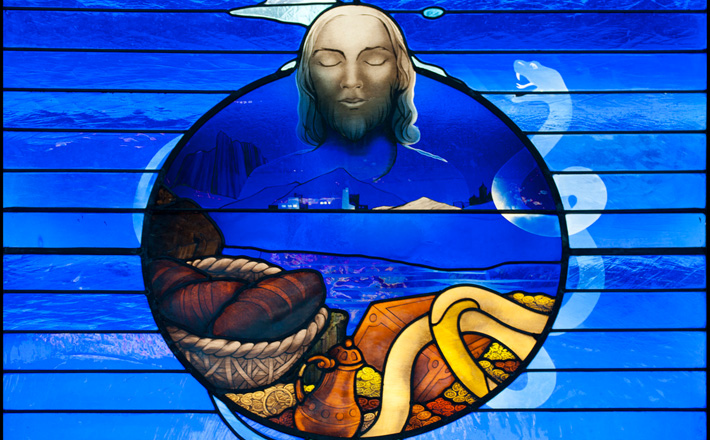Commentary on Romans 5:12-19
This text has been the source of some of Christianity’s most controversial, challenging, and distinctive doctrines.
It was the locus for Augustine’s doctrine of original sin and for K. Barth’s claim that Paul is saying that just as Adam was the source of humanity that could not escape obedience to sin, Christ is the source of humanity freed from obedience to sin. Barth hears Paul saying that “there is no man who is not — in Christ” (Romans, p. 182).
Paul began this chapter with the ringing claim “having been justified.” The circumstance that he and his hearers share is that of “having been justified,” or this could also be translated “having been made righteous.” He has qualified this with the words ‘by faith’ (Romans 5:1). The starting point, the ground of our being as believers, the basis of our identity, our most fundamental defining shape is that we have been justified by faith.
This remarkable state of affairs has a back story. Starting at 5:6, Paul tells the story that lies behind it all — the story of Christ. In 5:6-11 Paul focuses on Christ’s death and resurrection. In verse 12, he moves to an earlier stage of the story. Paul essentially says, “Once upon a time sin came into the world.”
Unfortunately for Christian theology ever since, Paul does not back up before that time. He starts this chapter of his story at the point at which sin entered the cosmos. It is important to note that sin is in the singular. Sin is here an active agent, an anti-God entity that can be the subject of a verb. We might think of sin with a capital ‘S’ — a spiritual agent at war with God.
Paul says that Sin entered through one man. He will go on to identify this man as Adam (verse 14). The result of Sin entering the world through Adam was death. Paul has been talking about how the death of Christ fixed everything. Here Paul is saying that what the death (and resurrection — for Paul never separates Christ’s death from Christ’s resurrection) of Christ needed to fix was death.
Paul’s diagnosis of the problem Christ came to fix is that Sin, through Adam, started a state of affairs in which Sin and death formed a lethal partnership. Because of Sin, there was death. And this state of affairs obtained for all humanity.
When Paul talks about “the many” — “for if many died through one man’s trespass” — he is being poetic. He clearly does not mean that some people do not die.
Paul believes that God through Christ fixed this sorry state of affairs. The convoluted language of verse 15b — “for if many died through one man’s trespass, much more have the grace of God and the free gift in the grace of that one man Jesus Christ abounded for many” — this language is meant to say that it is not simply that there was a remedy for the consequence of Adam’s trespass.
It is not simply that Christ cancelled out Adam’s mistake. It is that Christ more than made up for Adam’s trespass; Christ outdid himself, Christ made up exceedingly when perhaps God through Christ could simply have reversed Adam’s mistake in a legalistic, accountant kind of way. The free gift operates in a different arena than the audit room, the court room. The free gift operates in the arena of love.
So when Paul says that the free gift brings justification (verse 16), he wants to emphasize the wonder of justification. It is beyond what might have been required to fix humanity’s circumstances. If we wanted to be hypothetical about it, we might imagine that if God had wanted simply to redress the wrong Adam had done, God could have offered a solution in which humanity simply did not need to sin, and perhaps did not need to die.
This is not what Paul says that God offered in Christ. God offered this and so much more. God offered justification, righteousness — God shared God’s character, God’s own self, with us; offered us the possibility of becoming like Godself.
This is the very thing God did not want Adam to do — to become like Godself, to have the tree of the knowledge of good and evil. But this is what God offers in Christ — the opportunity to be made righteous, to be made like Godself, knowing what is good and what is evil and being able to choose.
And so, in verse 17, Paul stresses that through the one man Jesus Christ we are offered the opportunity to receive the abundance of the gift of righteousness. This means that not only will we not know death, but we will reign in life.
Paul does not overtly deal with the obvious question raised by his claim in verse 18. When Paul says that one man’s act of righteousness leads to acquittal and life for all — does Paul mean that whether or not one believes in this act of righteousness, believes in Christ, that God will acquit and give life?
Through the history of Christian theology, this question has received two main answers — yes and no. And because Paul does not make himself clear here, it should be very difficult for the adherents of either answer to claim certainty.
What Paul is clear about, however, is that God has responded with characteristic abundance. Where sin increased, grace abounded all the more. God’s grace, God’s free gift, God’s love is revealed in the fact that God did not just correct a problem, God created a new reality — the reality where instead of death reigning, grace reigns.
The reality in which we stand is the reality of grace, because we have been made righteous by faith. The dynamics of this reality are entirely different than the reality where death reigned.
In the reality of grace, righteousness calls the shots and eternal life is the norm. This state of grace, where there is freedom to be all that God created us to be — free to know God’s love and to love God, free to live forever — this state of grace has been given to us by Jesus Christ our Lord.


March 9, 2014